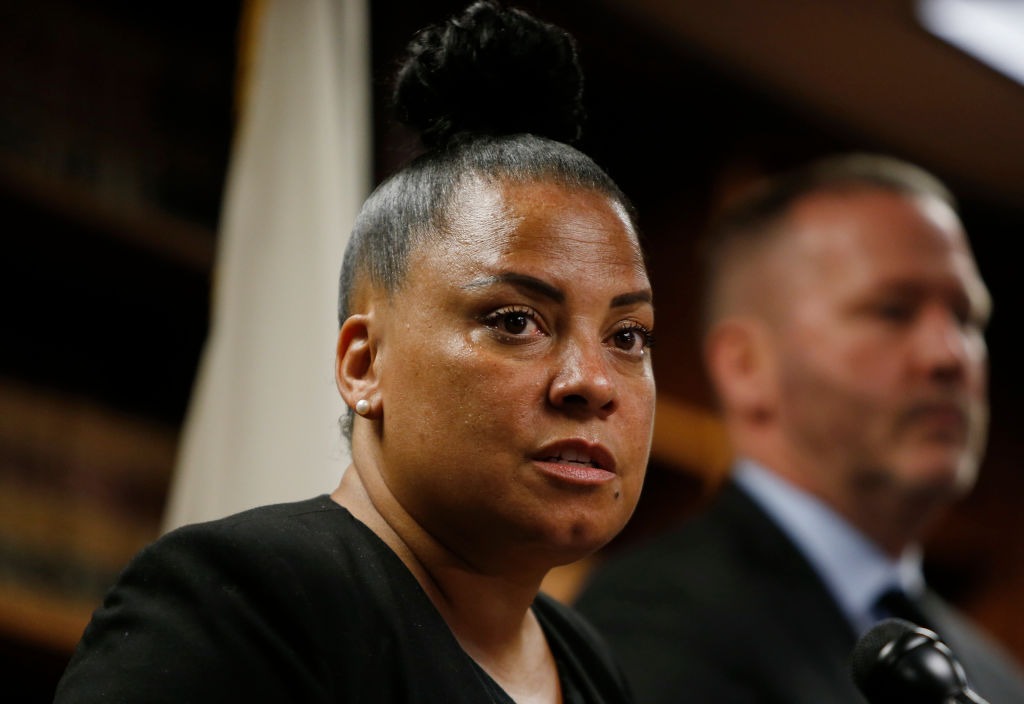The Suffolk County DA’s Attack On Public Defenders Was Misguided
During a Boston radio show where Rachael Rollins accused defenders of harming Black and Brown communities, the DA demonstrated that she misunderstands the role that prosecutors play in the criminal legal system: caging those very people.

This piece is a commentary, part of The Appeal’s collection of opinion and analysis.
There is an important boundary in our criminal legal system between those who usher people into the system and those who seek to free them from it.
In an April 30 interview with Boston radio station WGBH, Rachael Rollins, the elected district attorney of Suffolk County, Massachusetts, appeared to lose sight of that boundary when she criticized public defenders. When she discussed the case of a caller who said his lawyer failed to return his call, she described public defenders as “overwhelmingly privileged staff that aren’t calling back poor, Black, and brown people because they’re saying they’re overworked and busy” and lamented that “it’s my people who are losing no matter what. I’m not going to sit silently on this.” Rollins also took the extraordinary—and ethically questionable—step of urging people to call the DA’s office for updates on their cases.
Rollins seems to fundamentally misunderstand her role. Like all prosecutors, Rollins is a law enforcement officer, regardless of how progressive she claims to be. This truth remains regardless of the reforms she proposes or the reduction in the number of people she charges. Public defenders, by definition, advocate with and for those very people. These two roles exist on opposite sides of the adversarial process. Rollins should know that prosecutors—not public defenders—decide to charge and entangle her “people” in the web of the criminal legal system. Indeed, advocates for criminal legal reform and academics alike have argued that a prosecutor’s job inherently trades on the bodies of her “people.” While there can be collaboration between public defenders and prosecutors, only one of these roles is defined by advocacy for the human beings harmed by our criminal legal system.
Rollins chose to work in a system fraught with racial disparity. Massachusetts imprisons significantly more Black and Brown residents than white residents. And while Rollins is a Black woman, she has acknowledged the need for more racial diversity in the Suffolk County district attorney’s office, noting during her campaign that she wants to increase the diversity in the office by “probably 6,082 percent, because there are no women and people of color in upper leadership.”
Rollins’s comments about public defenders were also tone deaf in this moment of national crisis, as COVID-19 is rapidly spreading through jails and prisons and her office continues to seek incarceration for people awaiting trial. Conversely, public defenders are working tirelessly to advocate for and protect their clients from the carceral apparatus that delivers death to both incarcerated people and correctional staff. From the moment the pandemic hit, public defenders around the country jumped into action because the criminal legal system—the system that Rollins’s office forces them into—deprives people of the autonomy to make healthy and safe decisions, such as to socially distance or isolate. Public defenders work around the clock, often going into jails and courthouses despite the risks to their health and well-being. They are even performing services that jails and prisons have failed to deliver in this deadly moment, like bringing soap to clients.
Her attacks against public defenders reflect a critical lack of insight into the role of those on the other side of the courtroom. Public defenders choose to represent poor people ensnared in this system, despite other, more profitable career paths at corporate law firms or private practices. They frequently do so despite crushing educational debt. And defender offices around the country do this work despite rampant underfunding and understaffing. Low salaries for defenders in Massachusetts have caused high turnover and attempts at unionization.
Long before the advent of the progressive prosecutor, public defenders were on the front lines of the criminal legal system. Public defenders do this work because of—and despite—the efforts of prosecutors and law enforcement to arrest, charge, and incarcerate their clients. They often do so out of a commitment to the very communities Rollins described as her own—poor, Black, and Brown—and a drive to eke out some semblance of justice in a system that regularly fails to provide it. Public defenders are the advocates pushing against that system and helping people make sense of their lives. And while we, as women of color and former public defenders, recognize that the legal profession is in dire need of more Black and Brown attorneys, Rollins’s statements were starkly lacking in self-awareness.
Rollins was elected in late 2018 on a progressive platform. Many in Suffolk County—indeed, around the country—believed in her and the promises she made. But Rollins—and any prosecutor who seeks reform—must understand that meaningful change in the system cannot be accomplished without public defenders. Public defenders are closest to the people directly impacted by the system, and they are central to any real change.
On May 6, Rollins wrote a letter to the Massachusetts Association of Criminal Defense Lawyers and the Committee for Public Counsel Services acknowledging that her remarks about the WGBH caller were not “directed at, or intended for, the overwhelming majority of court-appointed lawyers who work tirelessly for their clients.”
Rollins did not, however, disavow her statements about public defenders, which were both derisive and dangerous. She should retract them, in recognition of the public defenders in Massachusetts and beyond, who uphold the constitutional right to counsel and represent the people she chooses to prosecute.
Premal Dharia is the founder and director of the Defender Impact Initiative, which works with public defenders and other advocates around the country toward transformative change in our criminal legal system; she was a public defender for nearly 15 years. Jullian Harris-Calvin is senior counsel for The Justice Collaborative and a former public defender.
